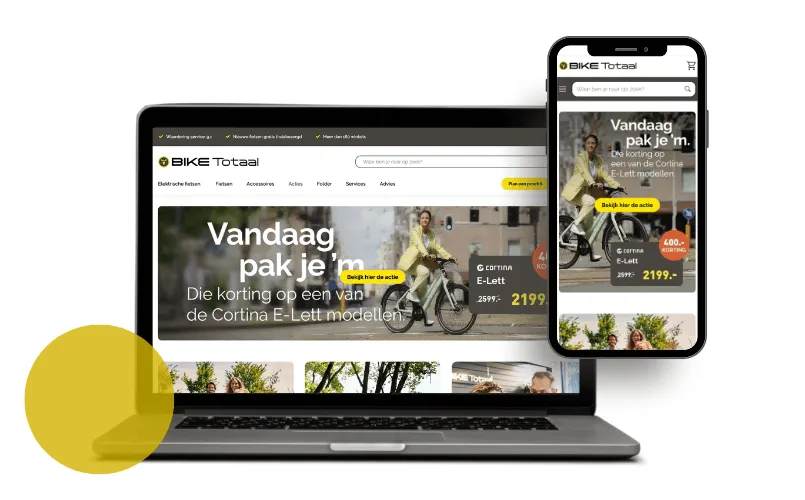Bike Totaal's Composable Commerce approach


Project Details
Client:
Dynamo Retail Group / Bike TotaalProject:
Headless frontend with Storyblok & AlgoliaSolution:
Webshop based on Composable CommerceCommerce platform based on Composable Commerce
Bike Totaal is a Dutch retail chain specialising in bicycles, bicycle parts and accessories, with an extensive network of affiliated bicycle shops throughout the country. The chain offers a wide range of bicycles for all ages and purposes, as well as professional repair and maintenance services.
For Bike Totaal, we realised a Composable Commerce platform in 3.5 months, implementing Storyblok, Algolia and Alumio, among others. This platform is future-proof thanks to its flexibility, agility and fast time-to-market.

The assignment
In 2023, it became clear that Bike Totaal and Profile ‘de Fietsspecialist’ would continue together under the new Bike Totaal formula. This required a new house style and design. The previous webshop was outdated and very expensive to maintain because of the many customisations. The merger of the two formulas and the desire to implement the corresponding house style online was an excellent time to redesign the technical set-up.
The aim of Bike Totaal's website and webshop is to inspire and convince consumers to take to their bikes more often. They want to achieve this by showing relevant content at the right time and always offering visitors the opportunity to visit one of the more than 160 shops. In addition, Bike Totaal wants to help its target group in their orientation towards a new bicycle and inform them about the various services they offer.
The solution
The basis of the solution is the implementation of a new storefront, a Content Management System (CMS), and a Search & Merchandising system that are in line with Dynamo Retail Group's vision of the future and the repositioning of the Bike Totaal formula. Setting up a composable (headless) storefront requires doing so based on ReactJS, implementing a cloud-based CMS and a cloud-based Search & Merchandising solution.
The headless storefront is managed by the Content Management System Storyblok, and in the backend, a Search & Merchandising component has been added through Algolia. The various systems are integrated in a modern way. They communicate directly with the frontend via APIs and are interconnected only in a few cases.
To communicate information between source and receiver in the complex landscape, a service bus, Alumio, was used. Many transformations, merges and business logic take place in the Alumio service bus.
Realised solutions
By adopting a Composable Commerce approach, Bike Totaal can now select components (systems) that best suit the brand and the departments that work with it. First, the hosting was converted to Hypernode and Vercel, after which the backend and frontend were decoupled. The key components here are the CMS Storyblok and Search & Merchandise Algolia.
By deploying the service bus, Bike Totaal has more flexibility with data exchange, minimal customisation on the systems and a user-friendly understanding of the interfaces. The service bus retrieves information from various sources, such as basic product information, enriched product information, stock information, delivery times, bicycle service packages and local entrepreneurs' assortment from POS systems.
To better serve the Bike Totaal stores, each has its own web page on which they can post information about, for example, vacancies, store information such as opening hours and the services offered. In addition, requesting a test ride was developed and implemented, allowing consumers to request a test ride directly through the website at their chosen shop. This has led to increased traffic to the shops.
For Dynamo Retail Group employees, the e-commerce system has been made more transparent and user-friendly. The webshop is clearly structured and, especially for the content department, it has become easier to manage content.
The project had a short lead time of only 3.5 months. The development process started at the end of October 2023 and was delivered in February 2024. Thanks to the cooperation and support of the parties involved, the project could be realised within the set deadlines.
"Since the implementation of the Composable Commerce platform, we experience more flexibility in creating campaigns and can better tailor the message to our target audience."